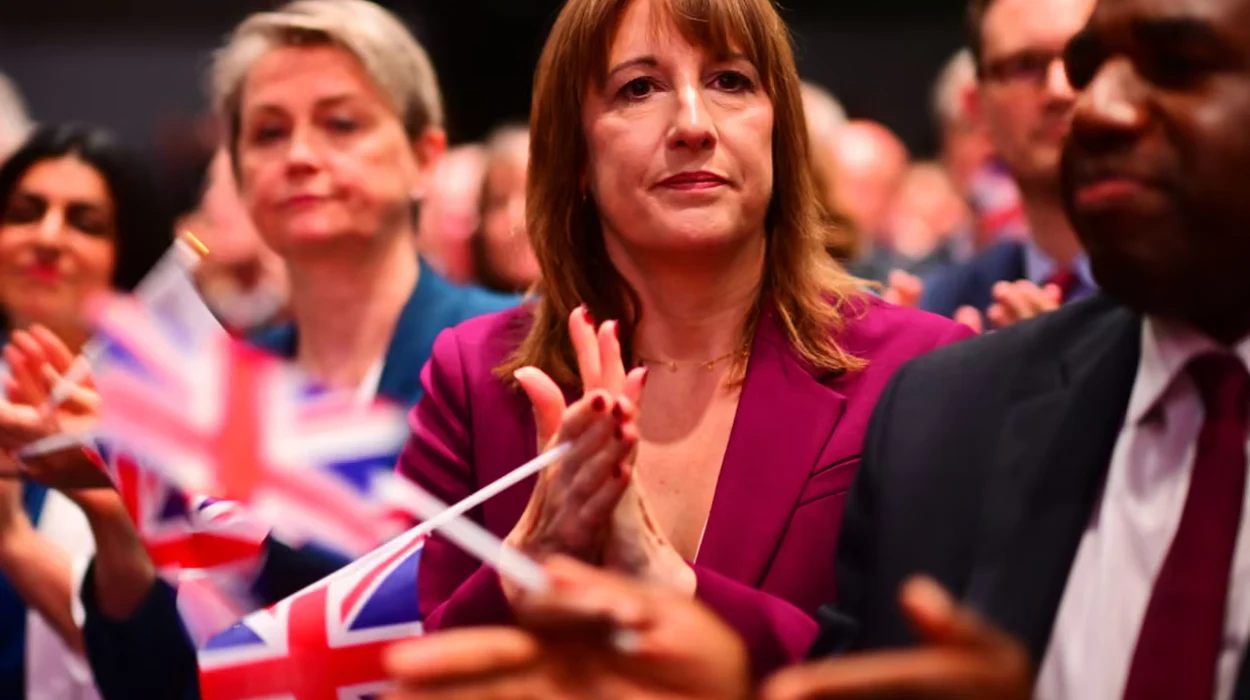UK (Parliament Politics Magazine) – Chancellor Rachel Reeves faces calls from Labour allies to scrap tax pledges, amid warnings a “pasty tax” budget may follow a £40bn shortfall.
As reported by The Guardian, Labour colleagues urge Rachel Reeves to abandon manifesto pledges, warning a “pasty tax” budget could spark backlash.
What did Rachel Reeves face as the OBR forecast reveals a £40bn Budget gap?
Sources said the Office for Budget Responsibility’s first fiscal forecast to the Treasury revealed tensions within the government over Labour’s manifesto pledges.
The party’s pre-election manifesto pledged to keep national insurance, VAT, and income tax unchanged, which together account for around 75% of revenue.
A source familiar with the pre-budget debate in Downing Street stated,
“There’s a political risk that No 10 are increasingly worried about, that we’re dying a slow death by the manifesto pledges, and the budget will look like a hodgepodge.”
According to colleagues, Ms Reeves remains committed to the manifesto promises and has not asked officials to cost any tax measures that would break them in the upcoming budget.
Insiders said the OBR’s review of productivity forecasts over the summer led to a considerably weaker preliminary growth outlook presented to Ms Reeves.
On Friday, 3 October, the OBR presented its first forecast including tax and spending. Ms. Reeves could face a £20–40bn gap against her £10bn headroom set in spring, considering higher borrowing costs and policy reversals.
How did the Treasury respond to OBR growth and tax forecasts?
Officials at the Treasury aim to ease the impact by convincing the OBR to consider the pro-growth effects of government policies.
A Treasury insider said,
“We are talking to the OBR about growth measures. There’s a lot of work going on with that.”
They added,
“We aren’t going to give a running commentary on the OBR’s forecasts. There is a lot of rubbish out there from people who claim to know what is in the budget before decisions have been made. The chancellor will make those decisions, no one else. As the Chancellor has made clear, Britain’s economy isn’t broken, but it does feel stuck. That’s why we will continue to invest in Britain’s renewal, to build an economy that works for working people.”
How does Labour consider tax options amid ‘pasty tax’ fears?
Earlier this week, at Labour’s party conference in Liverpool, Prime Minister Sir Keir Starmer’s chief secretary, Darren Jones, said the manifesto “stands today,” signaling a softer line on tax pledges than the Treasury’s recent stance.
According to the Treasury, a 1p rise in basic and higher income tax would raise £8.5bn, while a 1p increase on employee NICs would bring in £7.3bn. Officials see a VAT increase as unlikely, as it could further drive inflation, which remains above the Bank of England’s 2% target.
Number 10 sources are reportedly concerned that raising fuel duty, frozen since 2011-12, could be portrayed as an attack on the “white-van man.” Reconnecting fuel duty to inflation could generate nearly £5bn annually by 2029-30, the OBR says.
Measures under review may include national insurance on rental income, capital gains tax on wealthy emigrants, and limits on pension tax relief.
A cabinet minister said major companies want Labour to raise personal taxes, rather than implement a series of smaller measures, adding,
“It’s the pasty tax thing they’re worried about: 20 worthy things that raise £1bn each.”
How Labour could learn from George Osborne’s 2012 VAT backlash?
Former Tory Chancellor George Osborne’s 2012 budget collapsed quickly after a public backlash against proposed VAT changes on items like caravans and takeaway pasties.
Referencing that budget, a Labour strategist said raising income tax or national insurance would be easier to explain to voters than multiple small measures.
What would Minouche Shafik have recommended for Labour’s Budget review?
A former associate of Keir Starmer’s chief economic adviser, Minouche Shafik, said she would have pushed for a zero-based review of the budget, including broad tax increases.
Campaigners for tax reform had expected Labour would address long-standing issues, such as aligning capital gains and income tax rates.
What did Andy Summers say about the government’s tax pledges and reform?
Andy Summers, a director of the Centre for the Analysis of Taxation, stated,
“I actually think that the government’s manifesto pledges on the main rates of tax are actually a good thing, because it is going to force, frankly, that hard thinking about structural reform of the tax system.”
What did Mel Stride say about Rachel Reeves and the economy?
Shadow Chancellor Sir Mel Stride blamed Rachel Reeves for the economy’s poor performance.
He added,
“The Chancellor can avoid the questions, but she can’t escape the facts. Under Rachel Reeves we have seen inflation double, debt balloon, business confidence at its lowest level, borrowing costs at a 27-year high, and taxes up – with more pain on the way in the autumn.”
UK’s 2025 Budget
The UK Budget 2025 will be presented on Wednesday, 26 November. Chancellor Rachel Reeves faces a £20–40bn shortfall in public finances.
Tax rises are widely expected, though main rates of Income Tax, National Insurance, and VAT will remain unchanged.
Potential measures include freezes on thresholds, changes to Capital Gains Tax, and reforms to council tax or property taxes.


